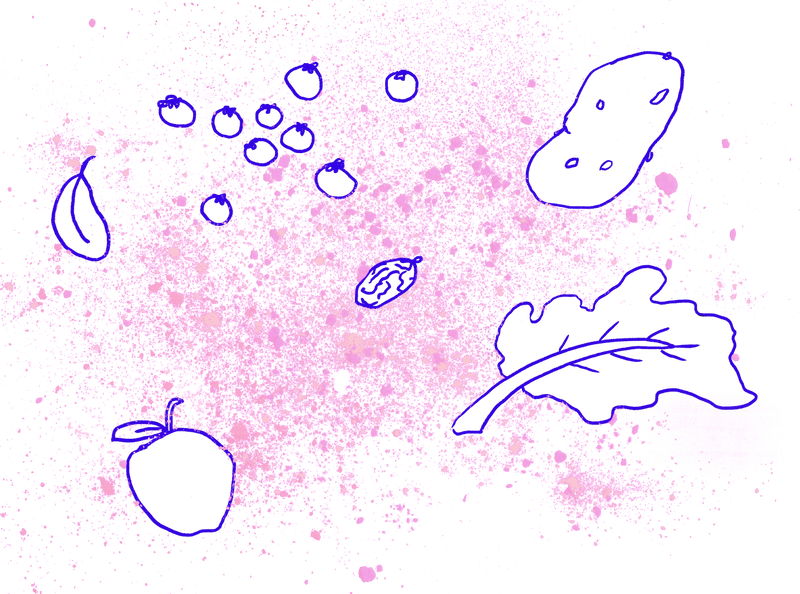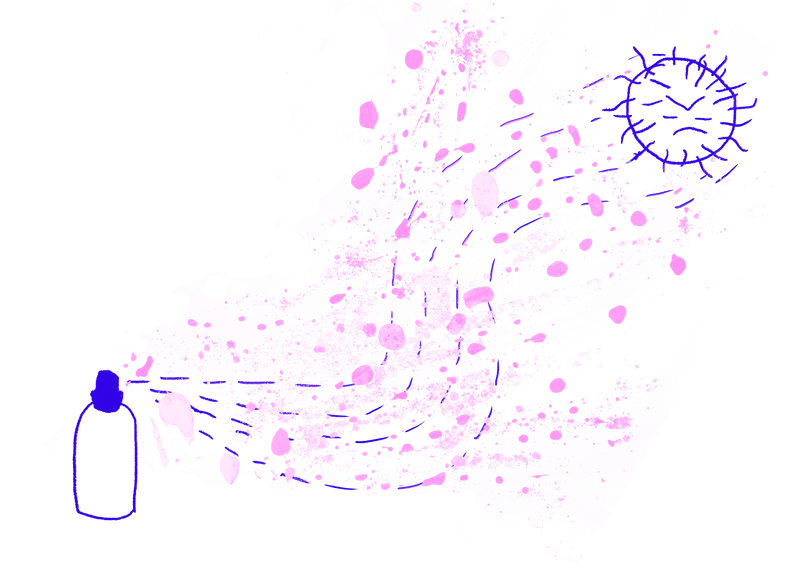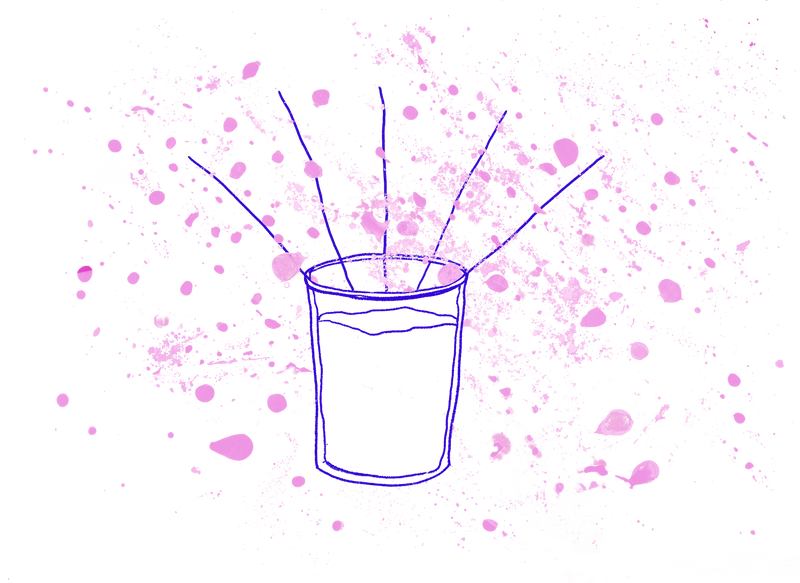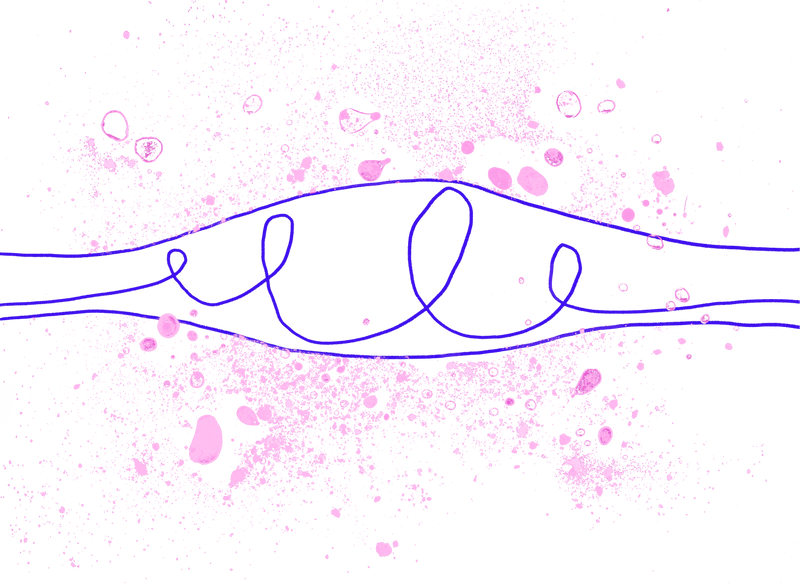A creative person’s guide to feeling healthy
“Grandfather, there are two wolves fighting inside of me. One is full of rage, is jealous and fearful. The other is full of peace, of joy and love. Which one is going to win?”
“Whichever one you feed,” replied the old man.
Artists and other creatives are a special species. With a deep desire to express inner landscapes in compositions that bring the rest of us to dream, many creators would prefer to spend their time locked away in the studio. But since the shift from music production to touring as a musician’s main income source, for many the studio-centric way of life seems like a distant memory. Today’s artists are required to do it all—from creating a steady stream of social media content, to managing a progressing release schedule, to non-stop touring—all to stay relevant in our fast-moving times.
In this buzz of productivity, what happens to the creative mind and body? These days, each of us must find our own ways to deal with pressure, deadlines, and the ever-growing demand to deliver materials to support what is supposed to be a creative process. As a coach for mental & physical wellbeing, I work with leading figures in the creative industries to help them change negative mindsets and destructive behaviors. During the coaching they learn to make better lifestyle choices and gain more control over their health and state of mind. As a result they are able to reconnect to their creativity and feel inspired and excited by their life again. This guide will cover some of the most basic principles artists can use to feel their healthiest, while trying to do it all.
— Franziska Eichler, Wellbeing Coach
Understanding the creative brain
Our two brain hemispheres play inherently different roles when it comes to our state of mind: the right hemisphere is predominantly active during mindsets of creativity, intuition, and imagination, while the left side fires up during tasks of logic, decision making, and analytical thinking. As an artist, it’s crucial to understand that these mental states are inherently different. As we do our work, we are either in a decision-making mindset, or in a mindset of creation and intuition. And while it’s hard to switch to the much desired creative mindset, there are effective ways to help us get there. Below are a few I recommend.
Feed your body, feed your brain
Our bodies and minds are interconnected. When our gut and organs are under stress, we will likely feel tired, less focused, and irritable. The best way to keep our bodies healthy is through the foods we eat.
The largest filter, barrier, and converter between the outside world and our delicate internal environment is our liver. And even though it’s a powerhouse in cleaning the blood, protecting the heart, helping the digestive system, and converting nutrients to exactly the mix we need to survive and thrive, too often our lifestyle choices create a toxic and sluggish liver. This can translate to the mind in the form of toxic thoughts, anxiety, cravings, or fatigue—leaving no room for the creative process to unfold.
The brain feeds on glucose, the simple sugar molecule contained in fruits and vegetables. A lack of this “good” glucose will signal your adrenals to start pouring out adrenaline, which in turn will cue your liver to release its glucose reserves in order to prevent your brain from exhaustion. This flood of adrenaline is corrosive for your whole system and will put you in a stress response—consistently activating the sympathetic “fight or flight” nervous system.
But there’s a catch: even when we eat the right kind of glucose, but surround it by high levels of fat (think: potatoes with lots of butter, berries with cream, asparagus with hollandaise sauce, banana milkshake, caprese salad), the fat will prevent the glucose from entering our cells. This again starves the brain, and causes the adrenals to pour out adrenaline in an attempt to provide the much-needed glucose to our brains as we try to perform mental labor.
This means: increase the amount of good natural glucose from fruits and vegetables in your diet, to keep your brain cool and prepare it for steady, creative performance. Load up on potatoes, sweet potatoes, pumpkin, yams, leafy greens, spinach, kale, dates, bananas, mangoes, figs, berries, apricots, and apples. Sprinkle some herbs over your food, and include raw organic local honey in your dressings. Try to cut down on fats and proteins, and observe how that affects your energy levels and general feeling of wellbeing.
Tips for feeling healthier overall
Get regular exercise
For tens of thousands of years, humans’ sympathetic “fight or flight” stress response was crucial to our survival, quickly fueling our muscles with energy so that we could run away from danger. Today our stress levels (and feelings of danger) are consistently higher than ever, and yet these feelings are barely ever followed up by a physical response. As a result, all that ready-to-use energy gets stuck inside our muscles and tissues, leading to inner tension and, eventually, disease.
This means: work out, move your body, stretch yourself! A flexible body creates a flexible mind. The yogis practice asana (a sequence of yoga poses) so that afterwards, they can sit in meditation with an undisturbed mind. Similarly, it makes sense to work out before sitting down for a long studio session.
Practice mindfulness
The first step to change something, is to notice it. Learn to check in with yourself regularly, even if that means setting reminders on your phone. Ask yourself multiple times each day: “How am I? What do I need to do to have a better experience?” Then do that! It will also help you identify the most effective ways to change your state of mind. Get to know yourself, without judgement.
As you check in with yourself, treat yourself as you would treat a good friend—be kind, compassionate, forgiving, and patient. It sounds simple, but once we pay attention to our thought patterns, it’s shocking how frequently we allow negative, destructive thoughts to sneak in.
Breathe in, breathe out
Besides checking in with your mind and general wellbeing, learn to check in on your breath. Keep reminding yourself: “How is my breath?” Deep belly breathing through the nose has a grounding and calming effect, while erratic, shallow breathing patterns will lead to erratic thinking.
When inhaling through the mouth, the air will typically only reach the upper parts of the lungs (chest breathing), stimulating the “fight or flight” nervous system. By inhaling through the nose, the air comes in cleaner and warmer, allowing it to also reach the lower parts of our lungs (belly breathing), stimulating the “rest & digest” nervous system. At the same time, the exhalation generally has a calming effect.
This means: try to inhale deeply through the nose, and practice longer exhales than inhales. This will automatically calm your mind and bring about a more relaxed and focused state. This also works great before speaking or performing in public.
Here’s a breathing exercise to try before your next big talk or performance:
- For five minutes, take an inhale on two counts through the nose and exhale on four counts.
- Try to feel into your body: the soles of your feet, the shirt on the skin, your belly moving with every breath.
- For anyone who wants to go further, try five minutes of alternate nostril breathing to balance the two brain hemispheres and release fresh energy into your system.
Stay well-hydrated
Staying hydrated will help with concentration, digestion, and to keep your mind in a good place. Always carry water with you. If you find regular water boring, try squeezing in some lemon, or add sliced apple, cucumber, orange, and/or mint. Adding fruit or herbs doesn’t just look pretty and taste great—it also helps the water to hydrate you more efficiently by changing its structure to a more accessible version, than if you were drinking water alone.
Avoid alcohol & substances
Be mindful with alcohol and other substances. What can feel like a little helper to get you “in the right mood” can cost you in the long run by undermining your physical and mental health. Learn ways to increase your energy levels and get in a relaxed and focused state of mind without having to rely on alcohol or mind-altering substances.
This means: try to remove alcohol and other substances from your daily routine and make this choice known to your immediate environment. Instead, drink lots of water or other hydrating beverages such as coconut water, or try mate tea or green tea to keep your energy levels up. If you’re in a social drinking situation, you can sip on a longdrink glass of sparkling water with some ice and lemon, to avoid questioning.
Don’t compare yourself
Although most of us know that social media can exacerbate our feelings of isolation and lack, many artists think that their success depends on their presence on social platforms. They feel an expectation to feed the growing hunger for new content, while simultaneously having to stay informed with the activities of their peers. This behavior not only takes up an overwhelming amount of time and attention, but can also give the sense that everyone else is doing better than you are.
However, authenticity and individuality is what makes an artist interesting. Paying too much attention to what others want or do, will undermine the self-confidence needed to create something unique. And while the act of comparing ourselves feeds the desire for recognition and peer validation, it strips away our innate desire to experiment and learn, which are the building blocks of a creative process.
Try these practices if social media tends to get the better of you:
- Set a certain (limited!) time window aside for your daily social media bender
- Have a plan for how you want to spend time while you’re logged in (create a post, check an event page, respond to comments, etc.)
- Unfollow any profiles that give you the slightest feeling of anger, frustration, or envy
- Remove your phone from the bedroom, or use Airplane Mode at night
- Do not check social media first thing in the morning or before you go to sleep
A few healthy routines to try
In the morning: Detox your liver
During our sleep, the liver works incredibly hard to deal with everything thrown at it throughout the day. Its main job is to detox and regenerate our body by neatly wrapping up the toxins in our system so they may be disposed of at the end of a good night’s sleep. That’s why it’s so crucial to flush out our system first thing in the morning!
When you first wake up:
1. Drink ½ to 1 squeezed lemon in a large glass of warm water
- BENEFITS: Doing this helps your liver and digestive tract. It flushes out the toxins collected in your liver that are ready for disposal, alkalizes your system, gets your digestion started, and delivers a nice load of vitamin C to help the immune system and nervous system repair.
2. Drink pure, fresh celery juice on an empty stomach
- BENEFITS: Doing this enhances the entire immune system by drawing out toxins and strengthening the liver’s defense mechanisms. It starves, dismantles, and flushes out pathogens (bacteria & viruses) while hydrating organs and cells. It cleanses and repairs the stomach, digestive tract, and liver, strengthens hydrochloric acid, balances pH, calms & reverses inflammation, and helps stabilize blood pressure. The mineral salts contained in celery are building blocks for neurotransmitter chemicals, supporting the central nervous system and increasing focus and concentration. It also aids in nutrient absorption, stabilizes and supports the adrenal glands, and offers stress assistance.
3. Make yourself a liver detox smoothie:
- 2 bananas
- 2 cups wild blueberries (frozen)
- 1 cup fresh cilantro (or 1 tbsp dried)
- 1 cup orange juice
- 1 tsp barley grass juice powder
- 1 tsp Hawaiian spirulina
- 1 small handful Atlantic dulse
- optional: water to blend
The more of these ingredients you can include, the better! They are the most effective in this specific combination, as some extract toxins from the body and brain, while others hold onto them and pass them down the line until they get flushed out of the system.
Routines to keep you healthy while traveling
Making healthy choices while traveling will go a long way. Try to stick to a few simple rules:
What to eat / drink while on the road:
- Get fresh smoothies and juices whenever you can! Avoid added sugar and dairy; stick to mixed fruits and vegetables
- Cut down on fat and protein, while increasing vegetables to help the liver
- Remember: Fruits are good, while sugar is not! (highly inflammatory)
- Keep a few bottles of water on hand, and drink them before sleep, in the morning, and with added protein powder as a meal replacement if necessary
In flu season
- Be mindful of what you touch; wash your hands regularly
- Keep fingers and hands away from your face and eyes (don’t rub your eyes!)
- When dining out during flu season, it’s better to order piping-hot dishes to kill off viruses from kitchen staff, instead of ordering raw dishes / salads
- For immune support during air travel and other situations where you could catch a virus, try liquid zinc or Quantum Health TheraZinc Oral Spray (it comes in a 2 oz. travel size)
General tips
- Papaya and pineapple are great digestives after a meal (enzymes!)
- Melons should be eaten separately from other foods to avoid bloating and digestive problems
- Potatoes are good for you! (esp. cooled-down potatoes, as they feed good gut bacteria)
- Eat only when hungry, and wait a minimum of three hours between meals
- Eat a light dinner for restorative sleep and good energy in the morning
- Leave at least three hours between dinner and bedtime for digestion
“It is not about how often you fall off the wagon. It’s about how quickly you can get back on the train.”
Upon returning home
- First of all, cut yourself some slack. Take the time and create a space so you can nourish yourself on a mental and physical level. Find out what works for you to recharge your batteries.
- Acknowledge that as a creative person, you are more sensitive to other people’s energies. Especially being in the public eye and while on stage, you’ll often have a lot of energy thrown at you, or people sucking your energy/chewing your ear off while you try to prep for your performance.
- Back home, take a salt bath. Epsom salt baths are not only calming and nourishing for the nervous system, and helpful in releasing muscle tension and loosening stiff joints—they also neutralize weird energies we may have picked up in our travels.
- Celery juice or cucumber juice can also be especially replenishing after a tough trip.
Try nourishing the mind with healing sounds
- What we listen to influences us on a cellular level. Many people have radio or TV constantly running in the background, with people yelling or incessant “buy this, do that” messages, and don’t realize how toxic it can be for the already stressed-out mind.
- Vice versa, listening to some healing or relaxing positive sounds can turn our day and attitude around. Be mindful of the things you allow to enter your senses by establishing a certain “hygiene of the senses.” Noise-cancellation headphones could become your best friend while travelling!
Some healing sounds to support this process:
- 528 hz Healing Sounds (1 Hour) Meditation
- 432 hz DNA Healing/Chakra Cleansing Meditation
- 1 Hour Sufi Music of Turkey
- Mantra healing
Make healthy eating a routine
No more excuses for bad-food days! Use this staple shopping list and some recipes to prepare healthy smoothies to keep your mind and body strong.
Staple shopping list
- Frozen bananas (you can buy them frozen, or peel, cut, bag, and freeze your own ripe bananas)
- Frozen blueberries / raspberries / strawberries
- Frozen mango
- Frozen kale / spinach (portioned in small bits)
- Canned coconut milk
- Packaged coconut water (no added sugar)
- Packaged nut milk (almond, pistachio, or other favorite)
- Dried dates
- Hemp seeds / flax seeds / chia seeds
- Flax oil (also great for salads—only use cold, never heat it up)
- Coconut oil
- Cacao powder (raw)
- Maca powder (energizing, nourishing—strong flavor, use in small amounts)
- Peanut butter (no added sugar)
- Himalayan salt Note that it’s best to buy organic ingredients whenever possible.
Basic smoothie formulas:
- Banana + orange + dates + cinnamon (+ opt. cacao powder), or
- Banana + straw/blue/raspberries + dates + spinach/kale, or
- Banana + mango + spinach/kale
-
- liquid: add nut/oat/coconut milk (heavier) or water/coconut water (lighter)
-
- try adding a small amount of nut butter (eg. peanut butter, almond butter)
-
- try adding superfoods (cacao powder, maca powder, hemp seeds, flax seeds)
Five smoothie recipes to get you started:
- Bavarian Orange: 1 cup almond milk, 1 banana, 1 orange, 1 tbsp cacao powder, 1 tsp flax seeds, 1 date
- Mixed Berry PBJ: 1 cup water, ½ cup raspberries, ½ cup strawberries, 1 tbsp peanut butter, 1 tsp maca powder, 1 date, 2 tbsp hemp seeds, 1 tsp Himalayan salt
- Strawberry Superfood: ½ cup coconut water, 1 cup strawberries, 1 banana, 1 tsp maca powder, 1 tsp hemp seeds, 1 tsp (opt.) cacao powder
- Green Berry Bliss: 1 cup almond milk, 1 cup blueberries, 1 handful spinach, ½ banana, 2 leaves kale, 1 tbsp cacao powder, ½ tbsp flax oil, 1 date (opt.)
- Pleasantville: 1 cup coconut water, 1 mango, ½ banana, 2 handfuls spinach
Recipes are from 101 Smoothie Recipes with Joe Cross. You can download the full app on iTunes.
Staple supplements for supporting creative brains
1. Pharma GABA by Natural Factors PharmaGABA decreases the brain’s stress-related beta waves and increases the production of its alpha-waves, creating a sense of physical relaxation while maintaining mental focus. GABA is an important brain chemical that acts like a brake during times of runaway stress. It also promotes a calm, relaxed, and focused state of mind, in addition to supporting restful sleep.
2. Liquid Vitamin B12 (eg. by Natural Elements) A high-quality B12 with methylcobalamin and adenosylcobalamin is incredibly supportive in any healing process. Make sure it has both components! It helps with liver cell communication, improving the ability of cells inside the liver to transfer information to one another with ease, and protects nerve tissue that enters and runs all through the liver. It is highly instrumental to all of the liver’s over 2,000 chemical functions, and in activating the liver’s ability to utilize, process, and distribute all other vitamins and minerals that are stored inside of it.
3. B-Complex Plus capsules (eg. by Pure Encapsulations) Vitamin B6 (pyridoxine HCl and pyridoxal 5’ phosphate) supports proper amino acid metabolism, nervous system health, and promotes healthy neurotransmitter synthesis. B vitamins support the proper metabolism of carbohydrates, fat, and protein. Vitamin B1 in particular is required to form adenosine triphosphate (ATP), the key source of energy for the body. B vitamins support healthy cognitive and nerve function as well as memory, mood, and emotional well-being.
Staple teas
- Passion Flower and Elderflower teas are helpful for the nervous system.
- Lemon Balm is great for the nerves and brain.
Personal Note: Generally, I order my supplements on iherb.com or Amazon if they are not available at my local natural food store. My preferred brands are Thorne, Pure Encapsulations, and Natural Elements.
On dealing with insomnia
Insomnia saps our energy and impacts our physical, mental, and emotional wellbeing. It puts us at higher risk for heart disease, obesity, diabetes, and depression. Sleep deprivation is also linked to memory loss, lower mental performance, and slower response time—often leading to accidents or mistakes as well as self-doubt. Getting enough quality shut-eye is essential to regaining our health, vitality, and confidence—and it all starts with examining our lifestyle and habits.
Tips for overcoming insomnia:
- Avoid sensory stimulation in your bedroom. Light, noise, or an uncomfortable bed can activate your senses and disturb your sleep. Keep your bedroom dark and quiet, use power plugs with switches for electronics you don’t need, and black tape (band-aids also work) over all devices that emit light.
- Keep your bedroom cool. Studies show most people sleep better in colder conditions. Temperatures in the range of 60 to 68° Fahrenheit help the body’s core temperature drop, which in turn induces sleepiness. So if your bedroom is too warm, turn down your heat or open your windows.
- Detoxification of the body is another key to a calmer mind and better sleep. A toxic liver will cause toxic thoughts and a stressed, busy mind—which is hard to turn off when it’s time to sleep. So, if you’re suffering from insomnia, be sure to follow the tips earlier in this guide to support your liver.
Exercises to try when suffering from insomnia
- If you are feeling awake while trying to fall asleep, leave the bedroom. Engage in an activity that is boring, such as folding clothes. Don’t turn on the TV or computer, keep the lights low, and keep your activity slow and non-stimulating. Then return to your bedroom in about 30 minutes, and try to fall asleep again. If you’re still awake in 15 minutes, get out of bed and repeat. This may sound tedious or frustrating—and you may be tempted to just pop a pill—but research shows that “sleep hygiene practices” are more effective than drug therapy for overcoming insomnia in the long run. When you stay the course and gently train your brain, your mind will eventually surrender to your good sense—and sleep.
- Practice deep breathing, which calms down the mind. Put one hand on the chest, and one on the lower belly. Count the length of your inhale and exhale, then gradually increase the length of your exhale (aim for a 1:2 inhale-to-exhale ratio, but make sure not to strain your breath). Inhale first in the belly, then chest. Exhale first from the belly, then the chest.
- Try this breathing meditation.
Supplements for insomnia:
-
Ashwagandha Root Sometimes sedating herbs are ineffective. It’s not that the herb doesn’t work; it’s that the nervous system needs more nourishment. When we are “wired and tired” and can’t shut down even with herbal assistance, we need to turn to herbs like ashwagandha. It is an adaptogen, which supports the optimal health of the nervous system while helping it handle stress more efficiently.
-
California Poppy (tincture) California poppy contains sedative properties that make it highly beneficial for relieving anxiety, stress, panic attacks, insomnia, hypertension, colic, and even bedwetting in children. It is good at sharpening cognitive skills such as memory and concentration, is known to be a phenomenal natural pain reliever, and is a safe alternative to prescription anxiety or sleep medication. California Poppy tea is wonderful to drink before bed to help prepare the body for a full and restful night’s sleep.
In summary…
Every person is different—what works for you to feel healthy might not work for someone else. Learn to listen to your intuition, and trust that you are the expert in knowing what your body and mind need to thrive.
At any given moment, your state of mind dictates how you perceive your environment. Make it your mission to create the best possible experience for yourself! This might seem selfish at first, but only when we are in a good place with ourselves, we can be there for others.
And isn’t that what it’s all about?
Disclaimer: the descriptions and terminology used in this article are simplified illustrations of highly complex processes, meant to give an overview and general understanding for the regular reader.
Originally from a film production background, Franziska Eichler has worked in a high-performance music industry job since 2007, running tours for artists such as Plastikman Live, Richie Hawtin and Skrillex, and organizing label showcases for brands such as Minus, Items & Things, ENTER.Sake, PLAYdifferently, and others. She’s worked on all ends of the music industry, from mega festivals to small clubs, from running college bus tours to booking international headliners, from managing cutting-edge production to press & PR—while working with and learning from some of the best people in the industry. In 2017 Franziska decided to give up her leading role in the music industry, and transitioned to become a Yoga Teacher, Nutritionist, and Coach for Mental & Physical Wellbeing. Through her programs, she now helps industry leaders change negative mindsets and destructive behaviors, make better lifestyle choices, and have more control over their health and state of mind. You can connect with her on Instagram and Facebook.





